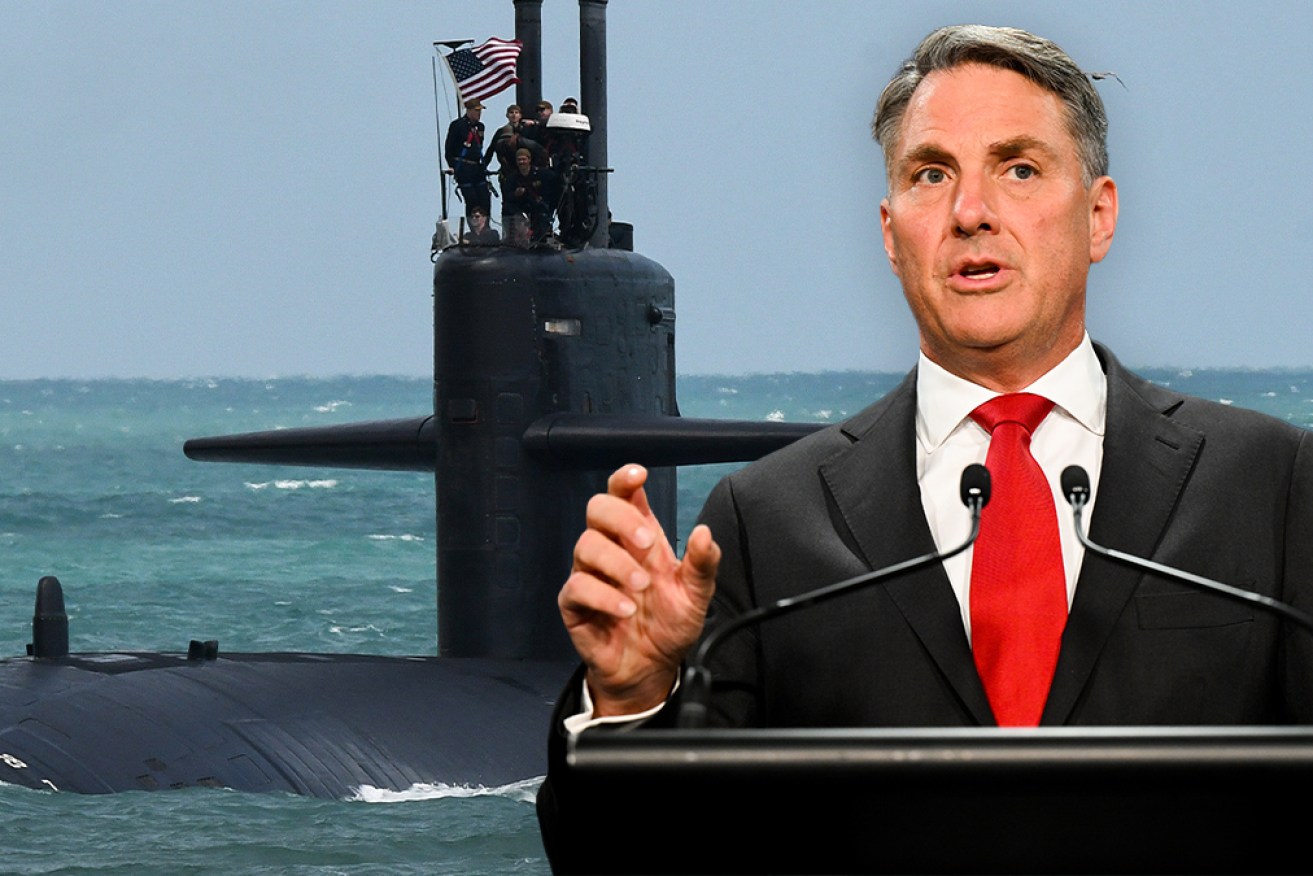Michael Pascoe: The defence review written before it was started


The defence review for Richard Marles asserts it's all the way with the USA, Michael Pascoe writes. Photo: AAP
The National Defence Statement 2023 is nothing if not predictable, going all the way with the USA, quickly rubber stamping the nuclear-powered submarines in particular, and AUKUS in general.
The review’s outcome was set before it started by the politics of Labor signing up in a matter of hours to carry Scott Morrison’s Anglophone burden. Paul Keating’s charge remains unanswered that Labor’s defence policy was set by wanting to provide no target when blindsided by Mr Morrison’s submarine adventure.
Having kindred spirits write the quickie review ensured there would be no surprises.
How politically aligned was the process? In acknowledging that it was indeed a quickie, barely six months in the making, the authors spun that “the short timetable helped our task”.
Well, I suppose limiting consultations to Hawaii, Washington and London – one’s AUKUS partners – does make things easier.
“We strongly support the acquisition of a conventionally armed, nuclear-powered submarine capability, including the establishment of an Australian Submarine Agency,” the authors decide.
More importantly, the breadth of defence capability the review demands – the ability to deter, strike and project force at long range on sea, land, in the air, space and cyber – means dependence upon the United States.
US v China
Yes, it’s all about the US v China: “A large-scale conventional and non-conventional military build-up without strategic reassurance is contributing to the most challenging circumstances in our region for decades.”
Defence Minister Richard Marles ordains in his preamble: “Australia must continue to work closely with our ally and principal strategic partner, the United States, through the alliance. Close co-operation with the United States is central to achieving balance and stability in the Indo-Pacific.”
We must “contribute with our partners to the maintenance of the global rules-based order”, Mr Marles states.
Which is where the hypocrisy and myopia kicks in – the question about who sets the rules.
Historic guide
China is rightly criticised for its ham-fisted attempts at economic coercion when it’s offended, but Beijing has barely used feathers in a game where the US has long thrown bricks and worse.
Try the 30-year trade embargo the US imposed on Vietnam after losing the war, after the massive destruction it wreaked on the land and people. When you write your own rules there’s no danger of reparations for being on the wrong side of history.
Try the 61 years and counting of sanctions and embargoes on Cuba, not to mention America’s military occupation of part of Cuba – Guantanamo Bay.
Try the flip-flopping of policy on Iran and subsequent sanctions and embargoes as Donald Trump scrapped the nuclear deal agreed by Europe, the US and Iran. When a Trump can make or tear up deals at whim, talk of global security and a “rules-based order” needs to be taken with a great deal of salt.
As long as we happily go along with, or turn a blind eye to, American aggression and coercion, as we have since Teddy Roosevelt was president, the American view is rosy.
Vassal state
Nobody would suggest letting China set our rules would be preferable, but ignoring the hypocrisy of supporting Uncle America, right or wrong, limits our security.
Whatever spin Foreign Minister Penny Wong tries to put on it, to the extent that most of the world cares, it sees Australia as an American vassal state.
The defence review reinforces that, charging ahead with policies regardless of regional sensibilities. Indonesia and Malaysia aren’t nearly as keen on our military escalation as American and British arms manufacturers are.
The Sinophobes and the defence review keep pushing China’s military build-up as justification for our own military build-up. That China’s military spending remains a fraction of the United States’ is overlooked, that the American “pivot to Asia” started the escalation is ignored.
The possibility of Australia having independent defence and foreign policies is not considered – it smacks of treason.
Vital alliance
“Our alliance with the United States will remain central to Australia’s security and strategy,” states the review.
“The United States will become even more important in the coming decades. Defence should pursue greater advanced scientific, technological and industrial co-operation in the alliance, as well as increased United States rotational force posture in Australia, including with submarines. Investing in our Indo-Pacific regional partnerships remains essential.
“Australia’s focus must be to deepen its engagement and collaboration with partners across South-East Asia and the Pacific. The Defence Co-operation Program should continue to grow, particularly in the Indian Ocean region. Australia also needs to continue to expand its relationships and practical co-operation with key powers, including Japan and India, and invest in regional architecture.”
Narrow focus
The narrowness of the review’s target can be seen in that paragraph. A genuine strategic review would scrap the American prism and take a broader view.
Nuclear-armed India is as much a Russian friend as China. India’s demographics are creating internal tensions, while China has started its ageing and shrinking stage. India is retreating from democracy under a religion-based government that has parallels with China in its treatment of religious minorities and a troublesome region.
But while the US sees India as a tool in its plan to contain China, all that will be overlooked and India’s own arms race will be encouraged.
An independent defence review would be looking beyond the immediate American imperative of increasing tension with the rising China. This was not an independent review.
As for the politics of releasing the review on the eve of Anzac Day – how very tacky.








